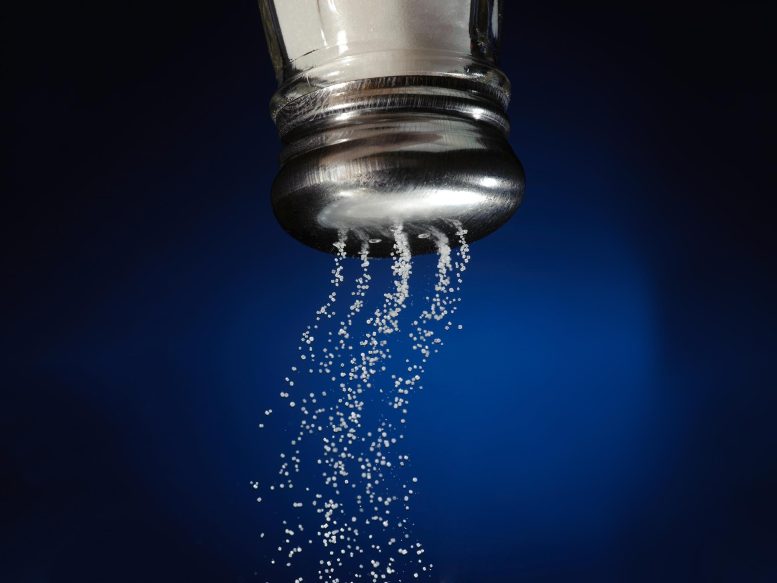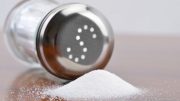
According to a new meta-analysis presented at the American College of Cardiology’s Annual Scientific Session Together With the World Congress of Cardiology, individuals suffering from heart failure may not receive any additional benefits from limiting their dietary sodium intake below the recommended maximum level of approximately 2.3 grams per day. In fact, the analysis of nine randomized controlled trials suggests that such restriction may even raise the risk of death.
Cutting sodium below current recommendations could be counterproductive, research finds.
For people with heart failure, restricting dietary sodium intake to levels below the standard recommended maximum of about 2.3 grams per day does not bring additional benefits and may increase the risk of death, according to findings from nine randomized controlled trials in a new meta-analysis presented at the American College of Cardiology’s Annual Scientific Session Together With the World Congress of Cardiology.
“Limiting sodium is still the way to go to help manage heart failure, but the amount of restriction has been up for debate. This study shows that the focus should be on establishing a safe level of sodium consumption instead of overly restricting sodium.” — Anirudh Palicherla, MD
Heart failure, in which the heart muscle becomes too weak or stiff to pump blood effectively, is a chronic condition affecting over 6 million adults in the U.S. Physicians recommend a low-sodium diet to reduce blood pressure and avoid common symptoms such as fluid buildup and swelling. However, previous studies have reported mixed results regarding the optimal maximum daily sodium intake for people with heart failure.
“Our findings showed that restricting dietary sodium to less than the usual recommendation was counterproductive in the management of heart failure,” said Anirudh Palicherla, MD, an internal medicine resident at Creighton University School of Medicine in Omaha, Nebraska, and the study’s lead author. “This was in line with a recent randomized controlled trial suggesting that restricting sodium more than what we do now doesn’t necessarily lead to better outcomes.”
The U.S. Dietary Guidelines for Americans recommends that most adults limit dietary sodium intake to 2.3 grams per day or less, equivalent to about one teaspoon of table salt. The average American consumes over 3.4 grams of sodium per day.
In the study, researchers analyzed nine randomized controlled trials that assessed different levels of sodium restriction for people with heart failure and included data on rates of death and hospitalization. Most of the studies were conducted between 2008-2022, except for one earlier study published in 1991. Together the trials enrolled nearly 3,500 heart failure patients in total.
Analyzing outcomes across all studies, researchers found that patients following a diet with a sodium intake target below 2.5 grams per day were 80% more likely to die than those following a diet with a target of 2.5 grams per day or more. The sodium limits varied from about 1.2-1.8 grams per day in the more restrictive study arms. The analysis did not show a trend toward increased hospitalizations among patients following more restrictive diets.
“Limiting sodium is still the way to go to help manage heart failure, but the amount of restriction has been up for debate,” Palicherla said. “This study shows that the focus should be on establishing a safe level of sodium consumption instead of overly restricting sodium.”
The researchers said that there was significant variability in the study designs used in the clinical trials, including different participant baseline characteristics, different health care settings and different methods for tracking sodium intake and health outcomes. Some studies required participants to restrict their fluid intake in addition to their sodium intake, while other studies did not. However, Palicherla said that the number of studies and total number of participants gives the researchers a high level of confidence in the overall findings.
Future studies could help clarify the optimal targets for dietary sodium or identify subgroups of heart failure patients who might benefit from more or less restriction, researchers said. To limit sodium intake, experts recommend eating more fresh fruits and vegetables and cooking with basic ingredients rather than processed, boxed and canned foods and sauces that often contain high amounts of sodium. When eating out or buying prepared foods, ask for nutrition information or read the food labels and choose items with the lowest amounts of sodium.
Palicherla will present the study, “Sodium Restriction in Heart Failure: A Meta-Analysis of Randomized Trials,” on Sunday, March 5, at 11:15 a.m. CT / 17:15 UTC in Heart Failure and Cardiomyopathies Moderated Poster Theater 11, Hall F.









As someone who suffers with CHF and hypertension, I was placed on a restricted diet, which meant eliminating white bread, using salt & sugar substitutes, increasing water intake but limiting fluid intake to 1500 units dly.
However, when I was hospitalized w/ CHF, I Was given two forms of diuretics that enabled me to lose 51 lbs. Yet, my stomach began getting bigger when my diuretics were reduced citing I was losing too much weight too soon, which could affect my kidneys, or were affecting my kidneys.
I had gone into the hospital weighing some 380 plus lbs. At that time, my weight was generally between 290-303. Ny weight had come down to 251 until my cardiologist had altered my diuretics along w/ other meds, which was back in 2019. Since mid 2020 till now my weight constantly fluctuates but I’ve been holding between 289- 301.
So, is too little or too much the cause of my on going edema, heavy & tired feeling in my legs? I try to keep to my restricted cardiac diet;to avoid all processed foods is difficult for me, especially when it comes to orange sherbet and hagen daz strawberry ice cream.
It would appear on its face, that the weight I had lost, has, overvtime came back on me whether or not it’s physically noticeable.
My stomach is bigger due to abdominal organs being shift to the front that is partially due to an over sized renal cyst on RT kidney flank.